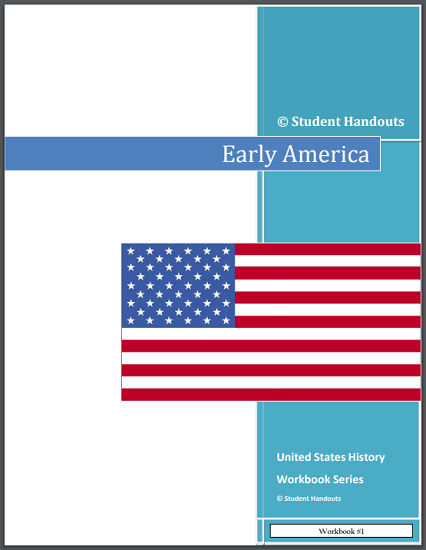| Early America—U.S. History Workbook #1 |
|---|
| U.S. History ↣ American History Workbooks ↣ U.S. History Workbooks for High School |
 |
    |
|
This particular workbook covers early American history, from the first Paleo-Indians to English colonists. This workbook is 24 pages in length. The answer key is below. Click here to print. 1 The First Americans 1. Beringia 2. Following wild game 3. Since 12,000 B.C.E. 4. Mammoth and bison 5. 3000 B.C.E. 6. Living in settlements near modern-day Phoenix; built ball courts, pyramid-like mounds, and a canal and irrigation system 2 Mound Builders and Pueblos 1. Adenans 2. Moundbuilders and great traders 3. People hunted, foraged, traded, and practiced agriculture; complex hierarchical society; slavery; human sacrifice 4. Southwest United States; stone and adobe pueblo apartment-like dwellings along cliff faces 5. Fishing and foraging; living in villages 3 Native-American Cultures 1. Between 2,000,000 and 18,000,000 2. Disease, especially smallpox 3. Extraordinarily diverse; closely tied to the land 4. Answers will vary 4 The First Europeans 1. Norse (Vikings) 2. John Cabot 3. Juan Ponce de Leon 4. Spain 5. Left Havana in 1539; landed in Florida; traveled west to Mississippi River looking for riches 6. Francisco Vasquez de Coronado started from Mexico in 1540; visited Grand Canyon and Kansas; horses that escaped from his group became the wild mustangs of the Plains and gave rise to Native-American horsemanship 7. Along the St. Lawrence River 8. St. Augustine in Florida 9. Sir Walter Raleigh 5 Early Settlements 1. Came in small, overcrowded ships; 6- to 12-week voyages; meager rations; many died of disease or lost at sea 2. Economic difficulties 3. commercial Revolution meant manufacture of textiles; manufacture of textiles meant raising more sheep; raising more sheep meant enclosing farmlands and evicting peasants 4. Taught them how to grow native plants 5. Trade with Europe for articles the settlers could not produce 6. Many cavaliers ("king's men" for Charles I) defeated by Cromwell decided to try becoming planters in Virginia 7. Oppressive policies of many petty princes, particularly with regard to religion, and the devastation caused by a long series of wars 8. The emigration from England was not directly sponsored by the government but by private groups of individuals whose chief motive was profit 6 Jamestown 1. James I 2. Captain John Smith 3. 60 4. John Rolfe 5. 1624 7 Massachusetts 1. Puritans 2. Leyden, Holland 3. D - Mayflower 4. C - Mayflower compact 5. Wampanoag Indians 6. John Winthrop 7. B - General Court 8. D - Puritan 9. Anne Hutchinson 8 New Netherland and Maryland 1. Henry Hudson 2. Fur trade 3. A - Albany 4. C - Manhattan 5. C - patroon 6. B - New Sweden 7. Calvert 8. St. Mary's 9. Property holders 9 Colonial-Indian Relations 1. C - fur trapping 2. Pequot War 3. King Philip's War 4. Iroquois 5. D - League of the Iroquois 6. B - French and Indian War 7. A - American Revolution 10 Second Generation of British Colonies 1. C - New Amsterdam 2. D - Toleration Act 3. D - South Carolina 4. B - 1664 5. A - French Huguenots 6. A - Charleston 7. D - Quaker 8. A - True 11 Settlers, Slaves, and Servants 1. B - Indentured servants 2. 1619 3. Slavery 12 The Enduring Mystery of the Anasazi 1. A - Ansazi 2. D - Flourished until the end of the sixteenth century 3. B - kivas 4. B - communal 5. A - drought |
| Early America Books and Films | Early America Image Galleries |
| Early America Learning and Study Games | Early America Miscellany |
| Early America Outlines and PowerPoints | Early America Worksheets |
| U.S. History ↣ American History Workbooks ↣ U.S. History Workbooks for High School |








